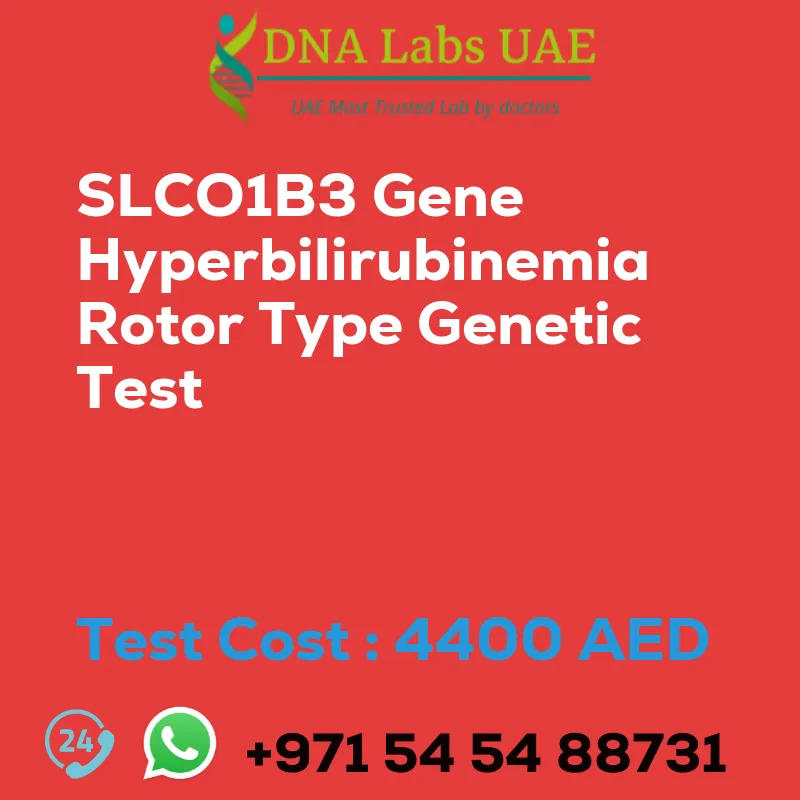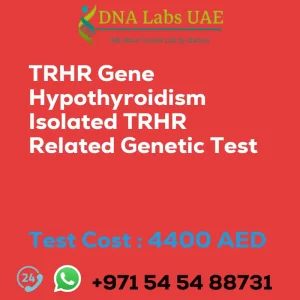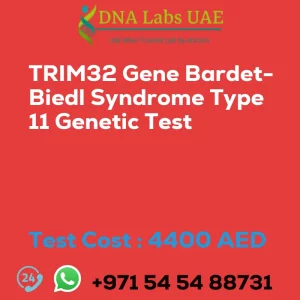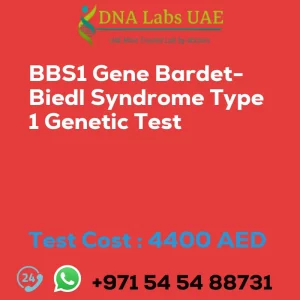SLCO1B3 Gene Hyperbilirubinemia Rotor type Genetic Test
At DNA Labs UAE, we offer the SLCO1B3 Gene Hyperbilirubinemia Rotor type Genetic Test for individuals who may be affected by this condition. Hyperbilirubinemia, also known as jaundice, is characterized by high levels of bilirubin in the blood, resulting in yellowing of the skin and eyes. Rotor type hyperbilirubinemia is a rare genetic disorder that causes elevated bilirubin levels without any underlying liver disease.
Our SLCO1B3 Gene Hyperbilirubinemia Rotor type Genetic Test utilizes NGS (Next-Generation Sequencing) technology to analyze multiple genes simultaneously. By focusing on the SLCO1B3 gene, we can identify specific mutations or variations that may be responsible for the disorder.
Test Details
- Test Name: SLCO1B3 Gene Hyperbilirubinemia Rotor type Genetic Test
- Components: NGS Technology
- Price: 4400.0 AED
- Sample Condition: Blood or Extracted DNA or One drop Blood on FTA Card
- Report Delivery: 3 to 4 Weeks
- Test Type: Hepatology, Nephrology, Endocrinology Disorders
- Doctor: General Physician
- Test Department: Genetics
- Pre Test Information: Clinical History of Patient who is going for SLCO1B3 Gene Hyperbilirubinemia, Rotor type NGS Genetic DNA Test. A Genetic Counselling session to draw a pedigree chart of family members affected with SLCO1B3 Gene Hyperbilirubinemia, Rotor type NGS Genetic DNA Test gene SLCO1B3
Diagnosis and Benefits
By performing the SLCO1B3 Gene Hyperbilirubinemia Rotor type Genetic Test, healthcare professionals can diagnose the condition, provide a prognosis, and potentially guide treatment decisions. This information is crucial for individuals and their families in understanding the genetic basis of hyperbilirubinemia and managing the disorder effectively.
It’s important to note that genetic testing should always be performed by a qualified healthcare professional who can interpret the results accurately and provide appropriate counseling and recommendations based on the findings.
If you or a family member is experiencing symptoms of hyperbilirubinemia, we recommend consulting with a general physician who can refer you to our Genetics department for further evaluation and testing.
For more information or to schedule an appointment, please contact DNA Labs UAE.
| Test Name | SLCO1B3 Gene Hyperbilirubinemia Rotor type Genetic Test |
|---|---|
| Components | |
| Price | 4400.0 AED |
| Sample Condition | Blood or Extracted DNA or One drop Blood on FTA Card |
| Report Delivery | 3 to 4 Weeks |
| Method | NGS Technology |
| Test type | Hepatology Nephrology Endocrinology Disorders |
| Doctor | General Physician |
| Test Department: | Genetics |
| Pre Test Information | Clinical History of Patient who is going for SLCO1B3 Gene Hyperbilirubinemia, Rotor type NGS Genetic DNA Test. A Genetic Counselling session to draw a pedigree chart of family members affected with SLCO1B3 Gene Hyperbilirubinemia, Rotor type NGS Genetic DNA Test gene SLCO1B3 |
| Test Details |
The SLCO1B3 gene is associated with a condition called hyperbilirubinemia, Rotor type. Hyperbilirubinemia refers to high levels of bilirubin in the blood, which can cause yellowing of the skin and eyes (jaundice). Rotor type hyperbilirubinemia is a rare genetic disorder characterized by elevated levels of bilirubin without any underlying liver disease. NGS (Next-Generation Sequencing) genetic testing is a technique used to analyze multiple genes simultaneously to identify genetic variations or mutations. In the case of SLCO1B3 gene hyperbilirubinemia, NGS genetic testing can be used to identify specific mutations or variations in the SLCO1B3 gene that may be responsible for the disorder. By analyzing the SLCO1B3 gene using NGS genetic testing, healthcare professionals can determine if an individual carries any mutations or variations that may contribute to hyperbilirubinemia, Rotor type. This information can help with diagnosis, prognosis, and potentially guide treatment decisions. It’s important to note that genetic testing should be performed by a qualified healthcare professional who can interpret the results and provide appropriate counseling and recommendations. |








